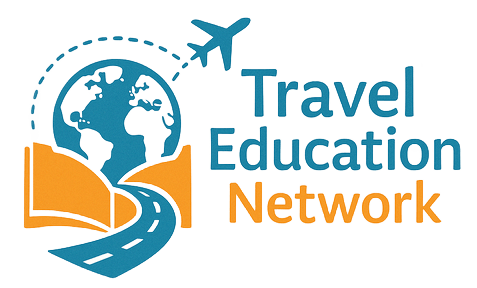The Future of Travel and Tourism Education: What Students Need to Know
Want a thriving career in travel and tourism? The industry is booming, with 57% of people planning their next trip and 83% prioritizing sustainable options. This means exciting opportunities, but also new challenges. Discover how digital advancements, sustainability, and the rise of experiential travel are reshaping the field. Learn how to gain the essential skills, from digital literacy to ethical leadership, to succeed in this dynamic landscape. Dive in to explore the future of travel and tourism education!
Important information

- Sustainability is a key trend: Tourism education must prioritize ecological, economic, and social sustainability principles to meet the growing demand for eco-conscious travel.
- Digital skills are essential: Students need proficiency in digital payment systems, online marketing, and other technologies like AI and VR, which are transforming the industry.
- Ethical leadership and social responsibility are vital: The pandemic highlighted the importance of humanistic tourism, ethical decision-making, and social responsibility for future tourism professionals.
- Experiential learning is crucial: Internships and other hands-on experiences bridge the gap between classroom learning and real-world application, enhancing job prospects.
- Multilingualism offers a competitive edge: Language proficiency and cultural understanding are increasingly valuable for effective communication and career advancement in the global tourism market.
The Future of Travel and Tourism Education: What Students Need to Know
The travel and tourism sector is evolving, creating a dynamic landscape for aspiring professionals. The industry seeks individuals with diverse skills, requiring educational institutions to adapt their curricula. Key trends shaping this evolution include sustainable practices, digital advancements, and the rise of meaningful, pet-friendly travel experiences. Students entering this field must stay informed about these changes to remain competitive.
Educational Tourism’s Promising Future
Educational tourism has a bright future, driven by technological progress and growing demand for global learning opportunities. Factors such as globalization, increased disposable incomes, and the focus on sustainable travel contribute to market expansion. To prepare students, tourism education must modernize teaching methods, emphasizing:
- critical thinking,
- creativity,
- ethical decision-making,
- humanistic management,
- sustainability, and
- social responsibility.
Digitalization’s Impact
Digitalization is revolutionizing the industry. Students must understand digital payment systems and online marketing strategies. Familiarity with internet-of-things (IoT) applications in hospitality adds further value. A career in travel and tourism remains attractive due to expanding global travel and rising disposable incomes. This creates diverse opportunities in specializations like hospitality, travel planning, and tourism marketing, influenced by technology and sustainability. Post-pandemic recovery and remote work are generating new niche markets.
The Importance of Sustainability
Sustainability is paramount. Educational programs must integrate ecological training alongside economic and social sustainability principles. This benefits the environment and enhances destination competitiveness. Emerging trends emphasize responsible tourism, incorporating technologies like artificial intelligence and virtual reality. Courses on digital nomadism and remote work are increasingly popular.
Lessons from the Pandemic
The COVID-19 pandemic exposed industry vulnerabilities, highlighting the importance of humanistic tourism principles, ethical leadership, and social responsibility for future managers. Students gain valuable experience through internships and networking, developing essential soft skills like communication and problem-solving. Language proficiency and cultural understanding provide a distinct advantage, as does continuous learning about industry trends and new technologies.
While technology enhances tourism education through virtual reality and e-learning, supplementing traditional field trips, the debate continues regarding their effectiveness compared to physical travel experiences.
Importance of Tourism Education
Tourism education equips future professionals with crucial skills, bridging the workforce gap and meeting industry demands. This training prepares students for the evolving tourism landscape by emphasizing sustainable practices, digital literacy, and ethical leadership. It also fosters global partnerships and stakeholder engagement to address challenges and promote responsible tourism management. Furthermore, this education prioritizes human dignity and well-being through values-based principles.
Current Trends in Travel and Tourism
The travel bug is back! After a long hiatus, people are ready to explore the world again. A recent study shows 57% are already planning their next adventure. With restrictions easing, wanderlust reigns supreme, but with a twist: sustainable travel is surging in popularity. A remarkable 83% of travelers now prioritize eco-conscious options when planning their getaways.
Challenges and Opportunities in Tourism Education
The tourism industry faces high employee turnover, hindering training and education initiatives. Many employees, especially younger staff, often lack formal qualifications. Existing training programs often prioritize hospitality, neglecting other vital tourism sectors. This skills gap presents a challenge and an opportunity. Comprehensive programs aligned with industry needs are crucial, focusing on areas like sustainability, ethical leadership, and social responsibility. With rising demand for sustainable travel and skilled professionals, technologies like AI and virtual reality offer exciting learning possibilities.
Challenge
High employee turnover disrupts training and education. Many, particularly younger staff, lack formal qualifications. Current programs often focus on hospitality, overlooking other vital tourism sectors.
Opportunity
Comprehensive programs aligned with industry needs are crucial. Key areas include sustainability, ethical leadership, and social responsibility. AI and virtual reality offer enhanced learning opportunities.
Balancing Engagement and Responsibility
Educational tourism must balance engaging experiences with responsible practices, avoiding excessive commercialization.
Adaptability and Resilience
The COVID-19 pandemic highlighted the need for adaptable and resilient tourism practices. Incorporating humanistic tourism principles into educational programs is essential.
Improving Quality and Targeting Niche Markets
Accreditation programs can improve quality for ecotourism operators and tour guides. Careful product development allows businesses to target niche markets within educational tourism.
Bridging the Skill Gap in the Tourism Workforce
The tourism industry needs skilled professionals, but many young people lack advanced training. The Bachelor of Science in International Sustainable Tourism helps solve this problem. It gives future tourism professionals important skills, including digital literacy, adaptability, and a strong understanding of sustainable practices.
- digital literacy,
- adaptability,
- strong understanding of sustainable practices.
Effective communication and interpersonal skills are also very important for success. Future tourism managers need even more skills. These include critical thinking, ethical decision-making, and cultural competence. A successful tourism career depends on several key skills.
- excellent communication,
- customer service experience,
- strong organizational abilities.
Knowing multiple languages and being good with technology are also becoming more important in today’s world.
Enhancing Global Partnerships and Stakeholder Engagement
Impactful tourism education relies on strong partnerships. Engaging stakeholders, such as government agencies, tourism businesses, and local communities, provides students with incredible benefits.
- practical experience,
- valuable industry insights,
- help in building professional networks leading to better career opportunities.
These collaborations also ensure curriculum relevance.
- aligning it with industry needs,
- addressing skill gaps,
- promoting sustainable tourism practices.
Global Initiatives in Tourism Education
The UNWTO is addressing the tourism sector’s skills gap through several key initiatives. These include the Global Education Forum, which connects tourism ministers with educators and industry leaders to shape the future of tourism education. The Tourism Academy in Samarkand provides specialized, practical training to enhance the workforce. Finally, the Bachelor of Science in International Sustainable Tourism program equips students with the knowledge and skills to address UN-related tourism issues and global goals, preparing them for careers in sustainable tourism.
UNWTO’s Role in Addressing Skill Gaps
The UNWTO is developing specialized programs to equip students with the skills needed for today’s dynamic tourism job market. The UNWTO Education Toolkit provides valuable resources for educators and policymakers seeking to integrate tourism into secondary education. This toolkit offers practical recommendations, case studies, and best practices aimed at attracting and developing talent within the tourism sector. It is a crucial resource for ensuring the industry’s future success.
The Global Education Forum and Tourism Industry
The Global Education Forum fosters dialogue on reforming tourism education, connecting educators with industry experts to better align curricula with market demands. The forum encourages discussion on innovative policies and teaching methods, bringing together diverse perspectives to promote inclusive and sustainable tourism practices. It also addresses the industry’s skills gap, providing a crucial platform for collaboration and shaping the future of tourism education. Continued stakeholder engagement is key to the forum’s success.
Sustainable Tourism Education
Sustainable tourism is vital in modern education, preparing students for the rising demand for eco-conscious travel. As more travelers seek sustainable options, future tourism professionals must adapt and implement these practices. Educational programs need to evolve, incorporating ecological, economic, and social principles to equip graduates for managing tourism’s impact. This includes responsible resource management and community engagement, fostering a balanced workforce that protects the environment, promotes social equity, and ensures economic success. Educational programs focused on sustainable tourism should cover these key areas:
- Ecological principles: understanding the environmental impact of tourism and implementing practices to minimize it, such as responsible waste management and conservation of natural resources.
- Economic principles: developing sustainable business models that benefit local communities and promote fair wages, while ensuring long-term economic viability.
- Social principles: fostering cultural exchange and understanding between tourists and local communities, while respecting local traditions and customs.
By incorporating these principles, educational programs can create a generation of tourism professionals equipped to manage the industry’s impact and contribute to a more sustainable future.
Integration of Sustainable Practices in Curriculum Development
Sustainable tourism offers invaluable educational opportunities. Students should learn about eco-conscious travel and responsible practices. This knowledge is increasingly important as traveler demand for sustainable options grows. For example, 65% of US travelers surveyed prioritize such choices. This surge necessitates training professionals in eco-tourism, making sustainability’s integration into tourism education crucial.
Innovative Teaching Methods in Tourism Education
Technology is transforming tourism education. E-learning platforms offer students flexible learning opportunities. Virtual reality provides immersive experiences, allowing students to explore fields like hotel management and tour guiding through realistic simulations. This hands-on practice is invaluable.
Experiential learning is also crucial. Internships, for example, allow students to develop practical skills by applying their knowledge in real-world settings such as hotels and tourism boards. Study abroad programs offer enriching cross-cultural experiences that enhance students’ understanding of global tourism and broaden their perspectives.
Role of Technology in Education: E-learning and Virtual Reality
E-learning significantly expands access to education by offering online courses and resources. For example, virtual reality (VR) provides immersive experiences, such as virtual tours of distant destinations and cultural landmarks. The combination of VR and e-learning creates engaging, interactive learning opportunities that are both cost-effective and accessible. These technologies offer valuable alternatives to traditional learning methods, like costly field trips.
Experiential Learning and Internships
Tourism students gain valuable, hands-on industry experience through internships, applying their classroom knowledge to real-world situations. These opportunities also foster networking connections that significantly enhance future job prospects, giving students a distinct advantage.
Tourism Education Futures Initiative (TEFI)
The Tourism Education Futures Initiative (TEFI) champions ethical leadership and social responsibility within tourism education, preparing students for upcoming global challenges like sustainable tourism and technology integration. TEFI also addresses the industry’s skills gap by equipping future professionals with essential competencies. The initiative recognizes the evolving nature of tourism and understands the crucial need for ethical and responsible leadership.
Promoting Ethical Leadership and Social Responsibility
Tourism education must instill both ethical leadership and social responsibility in future professionals to ensure positive contributions to communities and the environment. The COVID-19 pandemic underscored the vital need for ethical and sustainable tourism practices. Educators play a key role by integrating humanistic management principles that emphasize these values, ultimately preparing students to effectively navigate the evolving challenges of the tourism industry.
Career Opportunities and Skill Development in Tourism
Tourism offers excellent career opportunities, particularly for young people. However, global youth unemployment remains a challenge. Tourism education can bridge this gap by equipping young people with crucial skills.
- digital literacy,
- sustainable tourism practices,
- strong communication abilities.
School-industry partnerships are essential, providing practical training through internships, apprenticeships, and job placements tailored for young professionals. Focusing on local community needs and offering cultural sensitivity training further enhances their employability.
Multilingualism is a valuable asset in the tourism sector, enabling clear communication with international visitors and boosting customer satisfaction while fostering positive cultural exchange. Tourism education should prioritize language acquisition.
This includes offering courses in:
- commonly spoken languages,
- languages specific to tourist destinations.
Combined with cultural understanding, language skills give young professionals a competitive edge, allowing them to cater to diverse tourist needs and create richer, more inclusive travel experiences. This ultimately leads to increased job opportunities and career advancement.
Addressing Youth Employment in Tourism
A disconnect exists between tourism education and the industry, leading to many graduates finding work outside the field. This skills gap contributes to youth unemployment and highlights the need for programs that combine classroom learning with practical experience.
The tourism sector’s high turnover rate hinders skills development and the retention of promising young professionals. Improving working conditions and establishing clear career paths are crucial for attracting and retaining talent.
With the increasing importance of sustainable tourism, education must emphasize sustainable practices. This includes environmental awareness, cultural sensitivity, and responsible management.
These educational adjustments are essential to prepare a future workforce ready to meet the growing demands of sustainable tourism.
Importance of Language Learning and Multilingualism
Multilingualism fosters cultural understanding and enhances communication within the tourism sector. This valuable skill is essential in our interconnected world, enabling professionals to engage effectively with international visitors, ultimately improving customer service and satisfaction. A multilingual guide, for instance, can offer a more enriching and immersive experience. Moreover, language proficiency opens doors to diverse career opportunities within the tourism industry. Acquiring multiple languages requires dedication, but it’s a worthwhile investment for anyone in this field.
Benefits of Multilingualism in Tourism
- fosters cultural understanding,
- enhances communication,
- improves customer service and satisfaction,
- offers a more enriching and immersive experience,
- opens doors to diverse career opportunities.
Why invest in language skills?
In today’s interconnected world, engaging effectively with international visitors is crucial. Language proficiency is a valuable asset in the tourism sector, leading to enhanced customer experiences and expanded career prospects. While learning multiple languages demands effort, the rewards are significant for tourism professionals.

















